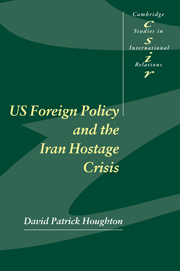Book contents
- Frontmatter
- Contents
- Preface
- 1 Jimmy Carter and the tragedy of foreign policy
- 2 Locating the argument: a review of the existing literature
- 3 The origins of the crisis
- 4 The waiting game
- 5 Days of decision: the hostage rescue mission
- 6 Hostages to history
- 7 Some alternative explanations: non-analogical accounts of the Iran decision-making
- 8 Conclusion
- Appendix 1 Dramatis personae
- Appendix 2 The major historical analogies used
- Bibliography
- Index
- CAMBRIDGE STUDIES IN INTERNATIONAL RELATIONS
1 - Jimmy Carter and the tragedy of foreign policy
Published online by Cambridge University Press: 22 September 2009
- Frontmatter
- Contents
- Preface
- 1 Jimmy Carter and the tragedy of foreign policy
- 2 Locating the argument: a review of the existing literature
- 3 The origins of the crisis
- 4 The waiting game
- 5 Days of decision: the hostage rescue mission
- 6 Hostages to history
- 7 Some alternative explanations: non-analogical accounts of the Iran decision-making
- 8 Conclusion
- Appendix 1 Dramatis personae
- Appendix 2 The major historical analogies used
- Bibliography
- Index
- CAMBRIDGE STUDIES IN INTERNATIONAL RELATIONS
Summary
When an American president has been defeated at the November election held to determine who will sit in the Oval Office for the next four years, he usually spends the last days and hours of his presidency preparing for the handover of power which takes place the following January. He contemplates, usually with much regret, the change which has come over his life, undoubtedly mulling over the unpleasant and sometimes icy task of escorting the winning candidate to his inauguration. He begins to plan what will come next, perhaps thinking about the arrangements for the presidential library which will carry his name.
The end of Jimmy Carter's presidency was different. His last two days were spent cloistered in the Oval Office with his closest advisers, enmeshed until the very last minutes in an issue which had come to obsess him personally and which helped destroy any prospect he might have had of achieving re-election in 1980: the release of the American hostages who had been held in Tehran for almost 444 days. That issue was about to become another man's problem. But Jimmy Carter was not a man to leave loose ends. There was unfinished business to do.
The president and his closest advisers worked around the clock, eating their meals in the Oval Office, their only sleep an occasional cat nap on one of the sofas which now adorn the Jimmy Carter Library in Atlanta.
- Type
- Chapter
- Information
- US Foreign Policy and the Iran Hostage Crisis , pp. 1 - 20Publisher: Cambridge University PressPrint publication year: 2001



